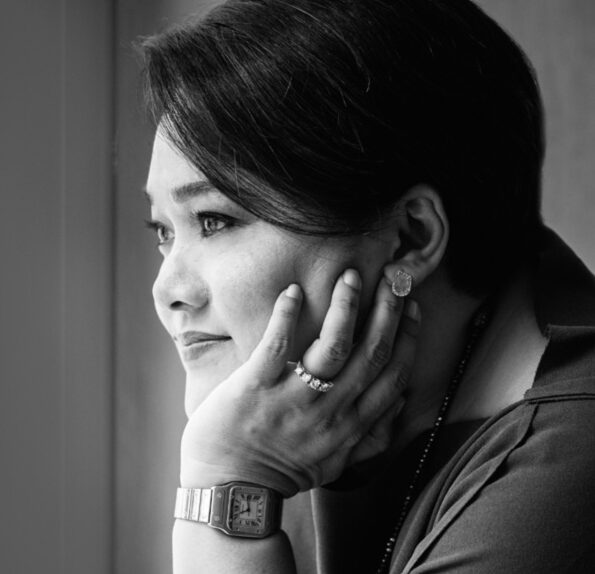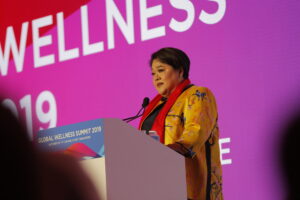

In this edition of the Wellness Q&A Series Beth McGroarty, VP, Research & Forecasting, Global Wellness Institute asks:
How will COVID-19 change the wellness market and concept?
What’s the real future for travel?
What are the right (and wrong) ways for brands to communicate during the pandemic?
Q&A with Catherine Feliciano-Chon, founder, managing director, CatchOn – a Finn Partners company

Cathy Chon is founder and managing director of CatchOn – a Finn Partners company, one of Asia’s leading brand communications agencies. Recognized for her provocative insights on travel, hospitality and wellness—and the Asian consumer and emerging trends—Cathy is widely published in major media, a sought-after speaker, and respected for her 30-year experience in building brands—and for her always honest and sound insights.
Beth McGroarty, GWI: You’re in Hong Kong. You’ve lived through SARS, the endless protests, and three-plus months of the COVID crisis. Much trauma and a “new normal” followed by a “new, new normal.” From your unique perspective, how will the Coronavirus MOST change the wellness market or concept?
Chon: My thought factory has been on overdrive, and I’m still trying to wrap my head around what IS the message of this time…
From an existential perspective, I believe it’s validated and exposed what wellness is really about: demanding that we pause, reflect, reset; that we be proactive about our—and our family’s and community’s health—in ways we never have before. It’s a pivotal time for the wellness movement, which is being called to a greater mission. We need to work hard to pull the polarized worlds of Big Medicine and Pharma and the prevention and wellness worlds much, much closer together. We simply can’t be working in two different swim lanes now. That means working for real change and with public health institutions and actually deserving a seat at the table (as opposed to just observing healthcare’s failures).
More industries will take action to bring together the medical-wellness polarity. Insurance companies are one, and we’re already hearing murmurs. Big insurance brands are now thinking, how do we win in the prevention space? Because the cost of taking care of all these sick people isn’t sustainable. A shock of this magnitude will change businesses, society and generations to come. You don’t come away from this thinking that you can go back to what you were doing before. “Medicine” and “wellness” can’t go back to doing things the way they were before.
COVID has also sped up a huge shift that seems like a polarity: a much more intense focus on fundamentals (family, human values, being grounded, “slow” living) but also a hyper-accelerated movement into a whole new technology era. We know the breakaway stars from this are telemedicine and digital wellness and that if you were a business that was slow to adapt to digital transformation, well, you’re in a rough spot right now.
COVID has given us a portal into what’s possible and ahead. We’re going to see such incredible innovation in technologies addressing all aspects of life: whether remote working, online learning, or in health and wellness. Health and wellness tracking and monitoring and biometric design will explode. I landed in London a couple of months ago, and we were told to stay in our seats for a few minutes. I thought healthcare workers would swarm on and take our temperatures, but no, we just sat there, and their heat-seeking technology could tell if any of us had a fever from afar. It blew me away.

GWI: You have such a heartbeat on travel. What will tourism look like post-COVID? Which segments will do better…worse?
Chon: I lived through SARS in Asia 17 years ago, and I truly believe travel will come back in a big, big way. Humans have an irrepressible desire to explore and be free, and no virus or terrorist attack has suppressed it. Look at the spike and innovation in travel post 9/11: all the budget airlines launching (driving affordable regional travel) and the birth of so many boutique hospitality brands. We’ve been locked inside, we won’t have a summer, and my long-term take is people are itching hard to travel, and will in a major way, when they feel it’s safe.
You read predictions that travel to remote nature and very private places—and slow and sustainable travel—will rise post-virus. Agreed. But that’s not the only kind that will spike. Travel will be more purposeful, and while we’ve had that concept a while, it won’t just be that solo safari to Africa. It’s, “I’m aching to travel, and I’m going to make it matter: We’re just going to splurge on that villa in Phuket.”
Shorter-term, domestic tourism and localism will surge. Surveys show the Chinese are eager to travel outbound again, but the reality is they will be traveling internally, and they’ve created a trillions-of-dollar road and railway infrastructure that’s way ahead of everyone. Every hotel in the world needs to create a bring-in-the-locals business model to survive; It’s what worked with SARS. Promotion will be at the micro, micro level: Hong Kong is about to roll out campaigns promoting Hong Kong to Hong Kong. You’ll see that everywhere.
I do think business travel will take hits long-term, and you need to reconfigure your business if that’s your sole product. Stay-at-home was a revelation about what we can accomplish on Zoom, and we know we don’t need to take all those business trips.
GWI: Other wellness markets that will be shaken up by Coronavirus?
Chon: The home will be reinvented. We’ve all been imprisoned at home, and they’re being seen anew. If we’ve always looked at home design through a purely superficial, aesthetic lens, the perspective will increasingly be about functional and wellness-centered design. We’ve been holding panels with architects/designers on this, and so many trends and ideas are emerging, from modular design that lets you move and reconfigure whole rooms (important in Asia where we live in small spaces and with our rising work-at-home future) to crisis-born design, including two-way cupboards near your door that zap your packages and belongings with virus-killing UV light.
The whole “wellness in the home” and wellness community trend will boom further, whether it’s simple things like creating your “wellness zone” at home or more super-sophisticated wellness real estate projects. We’re working on what will be Asia’s largest wellness community, Tri Vananda in Phuket (2022), which takes it to a new level: 230 acres of lakes and low-density, sustainable villas; organic farms; meditation pavilions; a spa; state-of-the-art functional medicine facilities and doctors on-site. It was designed for multiple generations and teaching next generations about farming and zero waste. This is the future. What people will want.

GWI: You’re a communications queen. What can you share with businesses about smart communications and crisis communications strategies during COVID?
Chon: This pandemic has thrown the way we do crisis communications on its head. In the old model, you would use scenarios and plan responses to hypothesized negative events. But everything is moving at breakneck speed, and public sentiment can change in minutes. For example, in Hong Kong, every case gets publicly reported, including all the public places they visited. You’re listed as a hotel or spa where an infected person visited, so you’re shut down overnight and have to quickly communicate that you’ve hired industrial-level disinfection, etc.
You cannot wait for the crisis to come to your doors; you must be aggressive with “pre-crisis communications.” I cannot believe how many businesses aren’t proactively and transparently communicating exactly what they’re doing on the hygiene and safety front. Every single business needs to make that the #1 message in their communications, their copy, at their website. Just send out an email and be transparent and detailed. Put it out there!
In marketing, PR, everything, you have to be flexible and agile like never before. This has been a mind-bending experience for us, keeping us on our toes day and night. You have a launch plan in place in a market tomorrow, and their cases quadruple. You create communications, you shelve them, you pause, you pivot, and you have to be ready and accept that you will get hit with changes every week, even every day.
Some brands have been tremendously agile: Look how LVMH mobilized within days after the pandemic hit to create millions of facemasks in their factories. Unless you’re in telehealth, digital fitness or a meditation app, nobody in wellness is looking to make money right now. But you need to stay engaged with people: Message who you are and how you’re helping, so when the lights flip back on, they remember you. We told our China office, you have all these people online desperate for content, create that content, and engage with them now.
GWI: What are the biggest silver linings of this crisis?
Chon: We’ve been given a time of deep reflection. As businesses, we need to grapple with what we offer, who we are, what we stand for. These are discussions I’m having with my employees: We can’t think that the old systems will work in the future, and even if they did, how could they work better? It’s like taking the Lego pieces apart, examining each piece carefully, and figuring out how we could build this better. The virus reveals problems, cracks and fissures in all organizations, and reflection is a trippy, uncomfortable feeling because it exposes both your strengths and weaknesses. It’s an opportunity because we ALL need to change right now.
Another silver lining is that it’s created a climate for radically greater collaboration because you realize you can’t go it alone anymore. We’re backing initiatives from other agencies designed to rescue our industries because it’s for our collective good. I see so much more collaboration ahead. The vaccine will be collaborative and global, not “China fixing China” or the “US fixing the US.” Coronavirus, it’s oft been said, is a metaphor for how everything touches everything in a global world. The positive: It will lead to a whole new era of connectivity and collaboration.
Additional Resources
- Embracing the Asian Century Worldwide – Global Wellness Summit Podcast with Cathy Chon and Yoriko Soma
- The Impact of China on Wellness…and Everything Else – Cathy Chon at the 2018 Global Wellness SummitRead More Q&As with Experts
We want to hear from you
How will COVID-19 change the wellness market? What’s the real future for travel? Leave a comment below…

























































Thanks for sharing. I found a lot of interesting information here.
This is amazing data – and so interesting to see that the wellness destinations you surveyed were more resilient and creative in responding to/anticipating the rebound. We thank you so much for sharing! Beth McGroarty, VP, Research, Global Wellness Institute
What great insights! Appreciate her thinkings, which are a couple layers beyond the obvious.
Great article, and your thoughts on the rebound of travel closely mirror what I’ve been seeing in my role as Director of Development | Wellness at WeTravel, a leading payment & registration platform for travel.
Our company recently concluded an industry outlook survey of 132 wellness retreat operators worldwide to assess the impact of COVID-19. These efforts were part of a larger 500+ respondent survey by our company to measure COVID’s impact on the travel industry broadly.
It was inspiring to see that wellness operators seem to be both more resilient and creative (i.e. in quickly adapting to offer virtual programming), as well as more optimistic about the timing and strength of the industry’s rebound. Four key takeaways are:
> Most respondents are confident that business will begin to pick up again in the fall of 2020.
> Close to half of respondents expect to see their 2020 revenue decline by >50% compared to 2019.
> Operators are taking a variety of approaches toward cancellations, postponements, and refunding clients.
> Nearly two-thirds of respondents believe the industry will have recovered by this time next year.
If anyone would like to read the full results, they are available at https://www.wetravel.com/stories/survey-covid-19-impact-wellness-retreat-industry/ (a full write up, a selection of quotes from industry players, a 2 minute video summary of the results, and a slide deck with the study data are all included there).